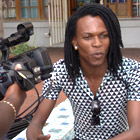Combatting Stereotypes of Gays and Lesbians
Resource type: Grantee Story
Under democracy and a progressive constitution, South Africa’s gay and lesbian community has won rights unequalled just about anywhere in the world. But for the majority of the country’s gays and lesbians – those who are black or poor – these rights largely exist only on paper. These individuals bear the brunt of homophobia and hate crimes including, in their most extreme form, the so-called “corrective” rapes of lesbians and effeminate gay men.
In February 2006, Zoliswa Nkonyana, a 19-year-old lesbian, was battered with golf clubs and bricks, then stabbed to death in Cape Town because of her sexual orientation. Her death serves as a graphic reminder that human rights remain a life-and-death issue for the majority of the lesbian and gay population.
Through the Reconciliation & Human Rights Programme, Atlantic provides support to nine organisations that make up the organised gay and lesbian movement in South Africa. Atlantic’s grants encourage these groups to strengthen emerging organisations in townships and rural areas, and to make human rights a reality for the majority of the lesbian, gay, bisexual and transgender (LGBT) community.
Purpose and Impact of the Grant
Out in Africa uses its Atlantic grant to run an annual film festival featuring movies and short films that promote a sense of self-worth and political purpose within the LGBT community. The festival was originally launched in 1994, to coincide with the advent of democracy, after decades of apartheid repression and criminalisation of same-sex behaviour. The 12th annual Out in Africa Gay and Lesbian Film Festival opened in Johannesburg on 9 March 2006, with 25 feature films and as many shorts on the bill, including several by South Africans.
Over the years, the festival has played an important role in giving the South African gay and lesbian community greater visibility, voice and pride. The demographics of the festival audience have changed over time as well; it is no longer largely white, male and middle class, but rather, much more diverse.
 In addition to the main festival, the organisation offers an outreach programme of mini-festivals, which has helped strengthen and extend other LGBT organisations in smaller communities. During 2005 and 2006, the festival traveled to communities such as George, Bloemfontein, Pietermaritzburg, Pretoria, Grahamstown and Ermelo, where gay and lesbian organisations are emerging. The festival’s Video Suitcase Project transports select films to neighbouring countries such as Namibia, Zimbabwe, Swaziland and Uganda, where being gay remains a crime and the films are watched in secret.
In addition to the main festival, the organisation offers an outreach programme of mini-festivals, which has helped strengthen and extend other LGBT organisations in smaller communities. During 2005 and 2006, the festival traveled to communities such as George, Bloemfontein, Pietermaritzburg, Pretoria, Grahamstown and Ermelo, where gay and lesbian organisations are emerging. The festival’s Video Suitcase Project transports select films to neighbouring countries such as Namibia, Zimbabwe, Swaziland and Uganda, where being gay remains a crime and the films are watched in secret.
The organisation also provides resources for local film-making.Its funding efforts have produced 16 South African Films over a three-year period. Through these many film-related activities, Out in Africa plays a key role in building LGBT identity, pride and confidence in the region.